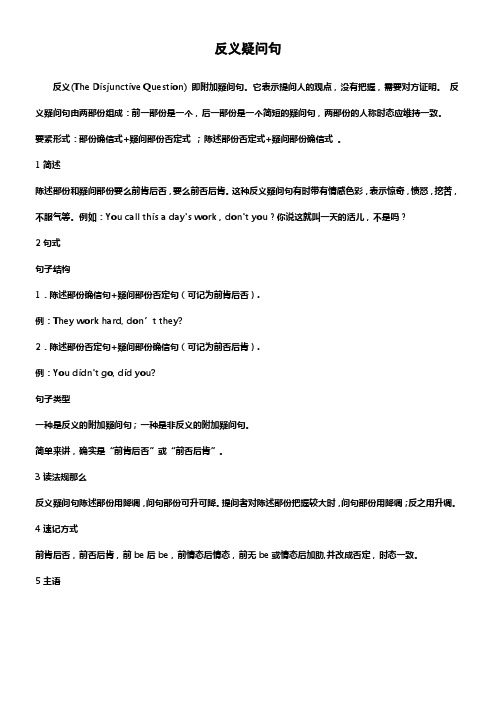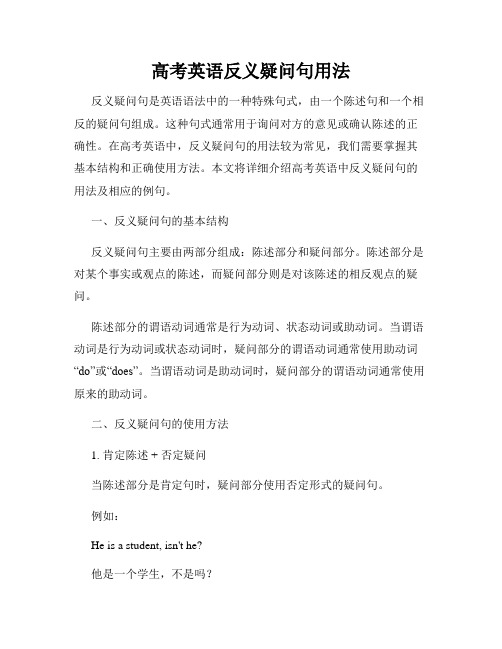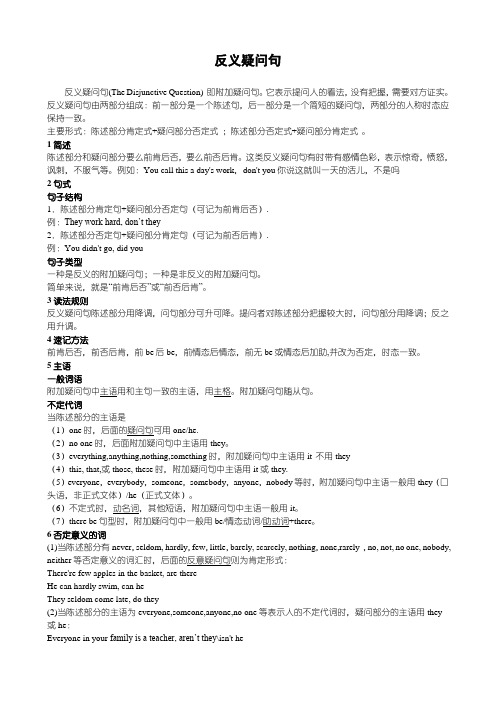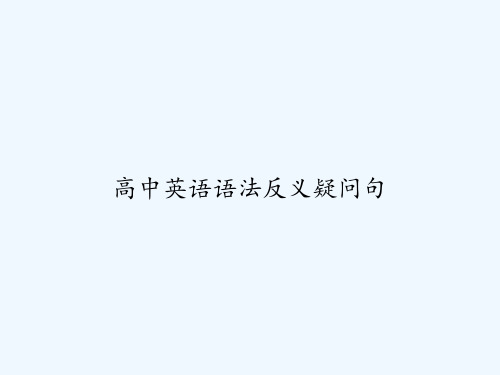(完整版)高中英语语法讲解反义疑问句
高中英语反义疑问句(详细)

反义疑问句反义(The Disjunctive Question) 即附加疑问句。
它表示提问人的观点,没有把握,需要对方证明。
反义疑问句由两部份组成:前一部份是一个,后一部份是一个简短的疑问句,两部份的人称时态应维持一致。
要紧形式:部份确信式+疑问部份否定式;陈述部份否定式+疑问部份确信式。
1简述陈述部份和疑问部份要么前肯后否,要么前否后肯。
这种反义疑问句有时带有情感色彩,表示惊奇,愤怒,挖苦,不服气等。
例如:You call this a day's work,don't you?你说这就叫一天的活儿,不是吗?2句式句子结构1.陈述部份确信句+疑问部份否定句(可记为前肯后否).例:They work hard, don’t they?2.陈述部份否定句+疑问部份确信句(可记为前否后肯).例:You didn't go, did you?句子类型一种是反义的附加疑问句;一种是非反义的附加疑问句。
简单来讲,确实是“前肯后否”或“前否后肯”。
3读法规那么反义疑问句陈述部份用降调,问句部份可升可降。
提问者对陈述部份把握较大时,问句部份用降调;反之用升调。
4速记方式前肯后否,前否后肯,前be后be,前情态后情态,前无be或情态后加助,并改成否定,时态一致。
5主语一样词语附加疑问句中用和主句一致的主语,用。
附加疑问句侍从句。
不定代词当陈述部份的主语是(1)one时,后面的可用one/he.(2)no one时,后面附加疑问句中主语用they。
(3)everything,anything,nothing,something时,附加疑问句中主语用it 不用they(4)this, that,或those, these时,附加疑问句中主语用it或they.(5)everyone,everybody,someone,somebody,anyone,nobody等时,附加疑问句中主语一样用they(口头语,非正式文体)/he(正式文体)。
高考英语反义疑问句用法

高考英语反义疑问句用法反义疑问句是英语语法中的一种特殊句式,由一个陈述句和一个相反的疑问句组成。
这种句式通常用于询问对方的意见或确认陈述的正确性。
在高考英语中,反义疑问句的用法较为常见,我们需要掌握其基本结构和正确使用方法。
本文将详细介绍高考英语中反义疑问句的用法及相应的例句。
一、反义疑问句的基本结构反义疑问句主要由两部分组成:陈述部分和疑问部分。
陈述部分是对某个事实或观点的陈述,而疑问部分则是对该陈述的相反观点的疑问。
陈述部分的谓语动词通常是行为动词、状态动词或助动词。
当谓语动词是行为动词或状态动词时,疑问部分的谓语动词通常使用助动词“do”或“does”。
当谓语动词是助动词时,疑问部分的谓语动词通常使用原来的助动词。
二、反义疑问句的使用方法1. 肯定陈述 + 否定疑问当陈述部分是肯定句时,疑问部分使用否定形式的疑问句。
例如:He is a student, isn't he?他是一个学生,不是吗?2. 否定陈述 + 肯定疑问当陈述部分是否定句时,疑问部分使用肯定形式的疑问句。
例如:She doesn't speak French, does she?她不会说法语,对吗?3. 陈述部分有实义动词如果陈述部分有实义动词(非助动词),则疑问部分使用助动词“do”或“does”。
例如:They like playing basketball, don't they?他们喜欢打篮球,对吗?4. 陈述部分有助动词如果陈述部分有助动词,则疑问部分使用原来的助动词。
例如:You can swim, can't you?你会游泳,对吗?5. 以let's开头的陈述句以let's开头的陈述句,疑问部分使用shall we。
例如:Let's go to the park, shall we?我们去公园吧,好吗?三、高考英语中的应用示例1. 完成句子The weather is nice today, ________?天气今天不错,是吗?2. 完成句子Tom isn't coming to the party, ________?汤姆不来参加聚会,是吗?3. 完成句子She will never forget this experience, ________?她永远不会忘记这个经历,对吗?4. 完成句子They have already finished their homework, ________?他们已经完成作业了,是吗?5. 完成句子Let's study harder for the exam, ________?让我们更努力地为考试学习,好吗?总结:反义疑问句是高考英语中的常见语法现象,掌握好其基本结构和正确使用方法对于理解和运用该句式非常重要。
高中英语语法反义疑问句知识与英汉差异

高中英语语法反义疑问句知识与英汉差异一.概念反意疑问句是附加在陈述句之后,对陈述句所表示的事实或观点提出疑问的句子.附加疑问实际上是一种简略的一般疑问句.二.相关知识点精讲1.反意疑问句的结构:陈述句(主语+谓语……),+助动词/情态动词/be动词+主语(代词形式)?说明:陈述句部分如果是肯定句,反意疑问句,疑问句部分的助动词/情态动词/be动词+not (否定提问);如果陈述句部分是否定句,反意疑问句,疑问句部分用肯定式提问。
例句:He is your teacher, isn’t he?People shouldn’t drop litter on the pavements, should they?You found the key in the bedroom, didn’t you?They have a house in town, haven’t they? /don’t they?The boy has to clean his room, doesn’t he?I am right, aren’t I?They’d rather go by bus, wouldn’t they?You’d better change your wet skirt, hadn’t you?He’d like to join our discussion, wouldn’t he?She ought to see a doctor at once, shouldn’t she? / oughtn’t she?I wish to say a few words, may I?That’s nice, isn’t it?This is the place, isn’t it?Everybody knows the answer, don’t they?Nothing is serious, isn’t it?There wasn’t enough time at that moment, was there?There used to a tower here, usedn’t there? / didn’t there?What you need is more practice, isn’t it?2.某些特殊句型的反意疑问句:1)祈使句的反意疑问句:表示肯定意义的祈使句,即表示“请求,提示”它的反意疑问句用will you 表达:有时也可以用won’t you 表示。
高中英语反义疑问句

反义疑问句反义疑问句(The Disjunctive Question) 即附加疑问句。
它表示提问人的看法,没有把握,需要对方证实。
反义疑问句由两部分组成:前一部分是一个陈述句,后一部分是一个简短的疑问句,两部分的人称时态应保持一致。
主要形式:陈述部分肯定式+疑问部分否定式;陈述部分否定式+疑问部分肯定式。
1简述陈述部分和疑问部分要么前肯后否,要么前否后肯。
这类反义疑问句有时带有感情色彩,表示惊奇,愤怒,讽刺,不服气等。
例如:You call this a day's work,don't you你说这就叫一天的活儿,不是吗2句式句子结构1.陈述部分肯定句+疑问部分否定句(可记为前肯后否).例:They work hard, don’t they2.陈述部分否定句+疑问部分肯定句(可记为前否后肯).例:You didn't go, did you句子类型一种是反义的附加疑问句;一种是非反义的附加疑问句。
简单来说,就是“前肯后否”或“前否后肯”。
3读法规则反义疑问句陈述部分用降调,问句部分可升可降。
提问者对陈述部分把握较大时,问句部分用降调;反之用升调。
4速记方法前肯后否,前否后肯,前be后be,前情态后情态,前无be或情态后加助,并改为否定,时态一致。
5主语一般词语附加疑问句中主语用和主句一致的主语,用主格。
附加疑问句随从句。
不定代词当陈述部分的主语是(1)one时,后面的疑问句可用one/he.(2)no one时,后面附加疑问句中主语用they。
(3)everything,anything,nothing,something时,附加疑问句中主语用it 不用they(4)this, that,或those, these时,附加疑问句中主语用it或they.(5)everyone,everybody,someone,somebody,anyone,nobody等时,附加疑问句中主语一般用they(口头语,非正式文体)/he(正式文体)。
高中英语语法_反意疑问句

(一)特殊情况 (1)陈述部分是I am 时,疑问部分常用 “aren't I?”代替更正式的“am I not? ”。 如: I'm late, aren't I? 我迟到了,是 吗? (2)如陈述部分是“there be”结构时,疑 问部分只需对换there be 的位置即可。如: There's something wrong with your watch, isn't there? 你的手表有毛病,对吗?
但疑问部分仍要用否定式。如:
She dislike it, doesn't she? 她不喜欢它,是吧?
(5)当 neither…nor, both…and 连接陈述 部分的两个主语时,疑问部分的主语常用 复数代词。如:
Both you and I are not wrong, are we? 你和我都不错,是吗?
5.牢记反意疑问句及答语的肯定,否定关系 的一般规则(“+”表示肯定,“—”表示否 定): 问句中:“+,—”或“—,+”。 答句 中:“+,+”或“—,—”。 问中:He doesn't want to buy it, does he? 他不想买它,对吗? 答中:A:Yes, he does. 不,他想买。 B: No, he doesn't. 对,他不想买。
(二)当陈述部分主句的主、谓是 I (We) think(believe, imagine, expect, feel 等)加 that 引导的宾语从句时,疑问部分的主语 (代词)和动词要与从句的一致。如:
I think there is something wrong with the washer, isn't there? 我想洗衣机出了毛病, 对不对?
高中英语知识点归纳反义疑问句的用法

高中英语知识点归纳反义疑问句的用法反义疑问句是英语语法中的重要一部分,通过简短的附加疑问句,可以就前面句子的肯定或否定加以验证或表示对听话者的请求等。
掌握反义疑问句的用法对于高中英语学习来说是至关重要的。
本文将对反义疑问句的用法做一个归纳总结。
一、定义反义疑问句是由一个陈述句和一个简短的疑问句组成,一般由肯定和否定两种形式。
陈述句部分后面的附加疑问句由一个助动词和一个主语构成,其形式与陈述句前面的情态动词或助动词的否定形式相对应。
二、用法1. 如果主句是肯定陈述,附加疑问句部分一般使用否定形式。
例如:- You are a student, aren't you?- He plays basketball, doesn't he?2. 如果主句是否定陈述,附加疑问句部分一般使用肯定形式。
例如:- You don't like coffee, do you?- She hasn't finished her homework, has she?3. 如果主句是祈使句,附加疑问句部分使用will you。
例如:- Please pass me the salt, will you?- Let's go for a walk, will you?4. 如果主句是陈述句的一部分或修饰语从句,整个句子都使用附加疑问句的形式。
例如:- I know he is busy, doesn't he?- It seems that she doesn't like him, does she?三、特殊用法1. 在以Let us或Let's开头的句子中,附加疑问句部分使用shall we。
例如:- Let's go, shall we?2. 在带有never的陈述句中,附加疑问句使用ever。
例如:- He has never been to Paris, has he?3. 反义疑问句有时候用来征求对方的意见、请求等。
高考英语重点语法复习反义疑问句

反义疑问句反义疑问句The Disjunctive Question又叫附加疑问句Tag Question;在口语中,反义疑问句用于发起谈话、询问信息或是礼貌的请求别人去做某件事;反义疑问句由两部分组成:前一部分是一个陈述句,后一部分是一个简短的疑问句,两部分的人称时态应保持一致;总体规则一、反义疑问句的语调1、在说话人知道问题的答案,使用反义疑问句表示请求赞同时,后面的反义疑问句部分用降调; That film was fantastic, wasn't it ↘2、在说话人不明确问题的答案,使用反义疑问句表示说话人需要核实信息时,后面的反义疑问句部分用升调;You don't know where the boss is, do you ↗二、反意疑问句中的对应规则:1、反意疑问句中问句部分的谓语动词与陈述部分的谓语动词在语气上成相反的对应关系,即:肯定+否定否定+肯定①You can’t do it, can you②They are very late for the meeting, aren’t they2、反意疑问句中问句部分的动词与陈述部分的动词种类要对应一致;如:①He has supper at home every day, doesn’t he 不能用hasn’t he②They have known the matter, haven’t they 不能用don’t they3、反意疑问句中问句部分的动词在时态上应和陈述部分的时态一致;如:①They will go to town soon, won’t they 不能用don’t they或aren’t they②He works very hard, doesn’t he 不能用didn’t he或won’t he注:当陈述部分是I think 加从句时,疑问句应和从句的人称时态保持一致;I think chickens can swim, can’t theyI think Lucy is a good girl, isn’t sheI didn't think he was happy, was he三、反义疑问句中主语变化规则4、陈述部分的主语是everybody, everyone, someone, no one, nobody, somebody 等合成词或词组时,反意疑问句部分的主语在非正式文体中,往往用they,有时也用he;而当陈述部分的主语是指示代词或不定代词this, that, everything, nothing, something等时,反意疑问句部分的主语用it;①Everyone is ready for the experiment, aren’t they isn’t he② Neither side can win, can they can he5、当陈述部分以one不定代词做主语时,附加问句的主语在正式常场用one或you,非正式场合用he;One should always be ready to help those in trouble, shouldn’t one/you 每个人都应该随时准备帮助那些有困难的人,是吗One must serve the people heart and soul, mustn't he 每个人都必须要全心全意为人们服务,不应该吗6、当陈述部分的主语是不定式、动名词、从句、this或that,反义疑问句的主语用it;是those, these则用they① To learn English well is quite bene ficial to our future, isn’t it② Developing a good habit is very important for us students to learn our lessons well, isn’t it③That he doesn’t work very hard makes his parents worried, doesn’t it④This is important, isn’t it⑤That isn’t correct, is it⑥These are your friends Tom and Jack, aren’t they7、当陈述部分的主语是表示物的不定代词everything, anything, nothing等,反义疑问句的主语用 it;Something is wrong with your notebook, isn’t it 你的笔记本电脑坏了,是吗8、陈述部分的主语是none of…时,反义疑问句部分的主语应与of后的名词或代词保持一致;① None of the students went there, did they② None of the dish smells good, does it四、反义疑问句部分肯定和否定形式的判断规则9、陈述部分带有否定词或半否定词,例如:barely, few, little, never, hardly, scarcely, seldom, no, none, no one, rarely, nowhere, nothing, nobody, few, little等,反义疑问句的动词要用肯定形式;① There are few apples in the basket, are there② He can hardly swim, can he③ They seldom come late, do they10、如果陈述部分中的否定词仅带有否定的前缀或后缀,此类词不属于否定词,那么该陈述句应作肯定句处理,反义疑问句应用否定形式;① Your father is unhappy, isn’t he不能用is he②The man is dishonest, isn’t he 不能用is he③It is impossible to learn English without remembering more words, isn’t it不能用is it常见句型的反意疑问句11、当陈述部分是there be 存在句型时,反义疑问句的主语也用there;①There’s no help for it, is there②There’s something wrong, isn’t there12、感叹句的反义疑问句,其谓语要求用否定句;①What a clever boy, isn’t he②How exciting the game is, isn’t it13、祈使句后面的反义疑问句问题1 祈使句是否定形式,反义疑问句只能用will you;Let us stop to rest, will you2 祈使句是肯定形式,反义疑问句用肯定、否定均可;Give me some cigarettes, will you/ won’t you3 Let开头的祈使句要注意:1. Let’s 在意义上包含谈话的对方在内,表示提出建议或征求对方意见,其反意疑问句往往用shall we;Let’s have a basketball match this afternoon, shall we 2. Let us在意义上一般不包含谈话的对方在内,表示请求对方允许做某事的含义,let 有allow的意思;附加疑问部分用will you;Let us go out for a rest, will you3. Let me开头表示请求,反义疑问句用will you,或用may I;Let me have a try, will you/may I复合句的反意疑问句14、当陈述部分是一个带that引导宾语从句的主从复合句时,反义疑问句的主谓要和主句的主谓保持对应关系;但是,当陈述部分的主语是:I suppose, I think, I believe, I imagine, I expect 等结构时,反义疑问句的主语和谓语要和从句的主语,谓语保持一致关系;而且要注意到否定的转移问题;①I don’t think that you can do it, can you 不用do I②We don’t believe that the news is true, is it 不用do we③I don’t think that you can do it, can you 不用do I④We don’t believe that the news is true, is it不用do we15、当陈述部分是I’m sure that,;we are sure;I’m afraid that;We are sure that;I feel sure that 等后面跟宾语从句时,反意疑问句与后面的宾语从句一致;①I’m sure that you will succeed in passing the exam, won’t you②I’m afraid that John can’t go now, can he16、当陈述部分是并列句时,反义疑问句的主谓语要和离它最近的句子的主谓保持对应关系; Xiao Lin has been writing letters all afternoon but he should finish them now, shouldn’t he17、强调句或类似的句型结构的反义疑问句和句首的It is/ was保持一致;①It was last Sunday that he went to Beijing, wasn’t it②It is five years since he joined the army, isn’t it关于情态动词的反意疑问句18、陈述部分中有have一词,且表示“所有”含义时,反义疑问句部分既可用have也可用do; They have no time to visit the museum, do they19、陈述部分中有have to,反义疑问句部分用do;I had to finish my homework, didn’t I20、含有ought to 的反意疑问句,陈述部分是肯定的,疑问部分用shouldn't/oughtn't +主语; He ought to know what to do, oughtn't he / shouldn't he21、陈述部分有used to,反义疑问句部分可用used 也可以用did;①The old man used to smoke, didn’t he或usedn’t he②Tom used to live here, usedn’t he 或didn’t he22、带情态动词dare或need的反意疑问句,疑问部分常用 need dare +主语;① We need not do it again, need we② He dare not say so, dare you注:当dare, need 为实义动词时,疑问部分用助动词do + 主语;She doesn't dare to go home alone, does she23、陈述部分有wish时,反义疑问句的谓语用may,前后两部分都用肯定式;I wish not to be disturbed in my work , may I24、当陈述部分有情态动词must,问句有4种情况:1. mustn't表示“禁止,不可,不必”时,附加问句通常要用must/may.You mustn't stop your car here, must/may you2. must表示“有必要”时,附加问句通常要用needn't.They must finish the work today, needn't they3. 当must用来表示对现在的情况进行推测时,问句通常要根据must后面的动词采用相应的形式;① He must be good at English, isn't he②He must have finished his homework, hasn’t he4. 当must+have done表示对过去的情况进行推测一般句中有明确的过去时间状语,问句要根据陈述部分谓语的情况用“didn't+主语”或“wasn't/weren't+主语”;如果强调动作的完成一般没有明确的过去时间状语,问句要用“haven't/hasn't+主语”;① She must have read the novel last week, didn't she② You must have told her about it, haven't you25、陈述部分是I wish, 表示询问或征求意见,附加疑问部分用may I;I wish to have a word with you, may I26、弄清陈述句中的’d rather = would rather;’d better = had better反义疑问句部分前者用would,后者用had;① He would rather read it ten times than recite it, wouldn't he②You’d better get up early, hadn’t you注:其它特殊结构的反意疑问句27、陈述部分的主语是each of 时,如果强调单个,反义疑问句的主语用he或it;如果强调全体,则根据情况用they,we,you等;①Each of the boys had an apple, didn’t he/they②Each of the books costs us five yuan, didn’t we28、陈述部分的主语是由neither…nor……,either….or…..或not only……but…also等连接的并列的主语保持时,反义疑问句的主语常用相应的复数部分,而不与nor, or,but also 之后的主语主语保持一致;① Neither you nor I am wrong, are we② Either you or I am right, are we③Not only Tom but also Alice likes skating, don’t they29、陈述部分是:I’m ....结构,反义疑问句一般用aren’t II'm very keen on sports , aren’t I30、陈述部分有You'd like to +v. 疑问部分用wouldn't +主语;You'd like to go with me, wouldn't you。
高中英语语法反义疑问句-PPT

It is a fine day. Let’s go fishing, _sh_a_l_l_w_e_? Let us do this job,_w_i_ll_y_o_u_?
Turn on thewrialdl iyoo,u__/w__o_n_’t_?you
24
16)陈述部分是“there be”结构 时:
6
2)陈述部分用 no, nothing, nobody, never, few, seldom, hardly, rarely, little等否定含义 的词时,疑问部分用肯定含义。
The Swede made no answer, did he / she? Some plants never blown (开花 ), do they ?
He would rather read it ten times than recite it, wouldn't he?
13
8)陈述部分有You'd like to + v. 疑问部分用wouldn't +主语。
You’d like to go with me, wouldn't you?
14
9)must表示“推测”时,如何确
定反意疑问句?
He must be a doctor, isn't he?
He must like physics, doesn't
he?
You must have studied English,
haven't you?
He must have finished it
17)否定前缀不能视为否定词, 其反意疑问句仍用否定形式。
It is impossible, isn't it?
- 1、下载文档前请自行甄别文档内容的完整性,平台不提供额外的编辑、内容补充、找答案等附加服务。
- 2、"仅部分预览"的文档,不可在线预览部分如存在完整性等问题,可反馈申请退款(可完整预览的文档不适用该条件!)。
- 3、如文档侵犯您的权益,请联系客服反馈,我们会尽快为您处理(人工客服工作时间:9:00-18:30)。
反义疑问句1. 陈述部分的主语是this, that时,疑问部分的主语多用it;陈述部分的主语是these, those时,疑问部分的主语多用they This is a dictionary, isn’t it? Those are shelves, aren’t they? 2. 当陈述部分是there be结构,疑问部分用there做主语 There will not be any trouble, will there? 3. 陈述部分有neither, none, nobody, nothing, few, little, never, hardly, seldom否定词在句中,后面用肯定疑问句短语构成反义疑问句。 Neither of you will have coffee, will you? Nobody understood his speech, did they? 4. 陈述部分主语是everyone, everybody, someone, somebody, no one, nobody, anybody, anyone等不定代词,其反义疑问部分的主语可用he,也可以用they 5. 陈述部分主语是one, 反义疑问句的主语可用one或he 6. 陈述部分主语是something, everything, nothing, anything 等不定代词做主语时, 反义疑问句的主语要用it 7. 当主句主语为第一人称时,动词为suppose, think, believe, suspect, imagine, guess时 其后面的翻译疑问句的主语则应与宾语从句的主语一致 I don’t think you can do these exercises alone, can you? 当主句主语为二三人称,其后的反义疑问句的主语则应与主句的主语一致 You thought they could have completed the project, didn’t you? 8. 当陈述部分是并列句,反义疑问句部分和第二分句相匹配 Mary is a good girl but she often comes to school late, doesn’t she? 9. 翻译疑问句的陈述部分含有un-, im-, in-, dis-等否定意义的前缀构成的词语时,陈述部分被视为肯定含义,问句部分用否定形式 It’simpossible to learn English without remembering more words, isn’t it? 10. 当陈述部分带有情态动词must时,如表示“必须”,附加问句用must, 如表示猜测, 附加问句根据具体语境用适当的形式 He must finish the homework, mustn’t he? He must be very tired, isn’t he? 11. 祈使句后的附加疑问句用will you,但是let’s引导的祈使句后面用shall we 12. 特殊情况 I am very lucky, aren’t I ? We used to be ashamed of the way we look, usedn’t we?/didn’t we? She has a book, hasn’t he?/doesn’t he? I wish to have a drink, may I ? They ought to go there, shouldn’t they? oughtn’t they? He would rather read it yesterday, wouldn’t he? You’d better take his advice, hadn’t you? You’d like to go with me, wouldn’t you? We have to get there, don’t we? 语法填空之反意疑问句(学生版)
完成下列句子 1、Few of them hurt themselves in the accident last night,___________ ? 2.--You’ve never seen dinosaur eggs, have you ? --_______________. How I wish to visit the Dinosaur World. 3、His sister had a bad cough, _________she? 4、Mr. Green went to Shenzhen on business last week,________? 5. John can hardly understand any Chinese, _________he? 6、Don’t smoke in the meeting-room,_________? 7、Lucy, you clean the blackboard today,_______ ? 8. Miss Cheng will never forget her first visit to Canada ,________? 9、The lady couldn’t say a word when she saw the snake,__________? 10、__________the population of china? 1,300,000,000. 11、---______I go and meet you at the airport? ---No ,thanks, dear . I can take a taxi home. 12、------________is the Confucian Temple(孔庙) from here? ------It’s about 10 minutes’ walk. 13、-----_________may I keep these books? -----two weeks. 14、Tina is unhappy now,____________? 15、---You won’t follow his example, will you ? ---________________,I don’t think he is right. 16、----__________do you go to Hong Kong? ----sorry , I’ve never been there. 17、---The boy has to stay at home to look after his little sister,_________? ---Yes, because his mother has gone shopping. 18、----You lent me some money a few months ago. -----_________? I don’t remember lending you any money . 19、My uncle has never been to a foreign country,_____________? 20、There is some water in that bottle, ___________? 21、----_____________will the foreign students be back from NanJing? ----In two days, I think . 22、---Let’s go and play football,__________? ---That’s wonderful. 23. I don’t think that the necklace is made of diamond, __________? 24. His wife had the carpets and the curtains cleaned, ____________? 25.It’s my son’s wedding next week, and I have to do my best for that,__________? 26.Harry wouldn’t become a teacher if it hadn’t been for the holiday, __________? 27. No one left here yesterday,_____________? 28. Birds rarely build nests in our garden,_____________? 29. You must have been to the Great Wall,____________? 30. Learning how to repair motors takes a long time, _____________? 31.They must have stayed at home last night,____________? 32.There’s not much news in today’s newspaper, _____________? 33.They need our help badly at the moment, ______________? 34.She is unfit for the position, _____________? 35.I wish to visit America, _____________? 36.She’s been a worker here for many years,______________? 37.What beautiful flowers,______________? 38.Mother used to live in a poor village,____________? 39.You’d better go at once, _____________? 40.I am very interested in Mark Twain’s novels,____________? 41. He never gets up late , ? 42. Don’t go out , ? 43.Everything begins to grow in spring, ? 44.He can hardly finish the work, ? 45.Let us go home , ? 46. You think he is a good student, ? 47.Nobody knows where she lives, ? 48.Few students can answer the question, ? 49. You needn’t attend the meeting, ______________________? 50. We need to come on Sunday, ________________?
